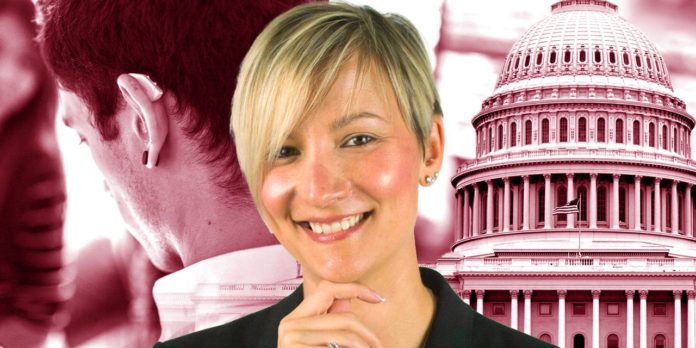
The Value Gap is a MarketWatch Q&A series with business leaders, academics, policymakers and activists on how to reduce racial and social inequalities.
At the dawn of the dot-com boom, Silicon Valley was an ideal place for KR Liu to grow up and immerse herself in the latest gadgets. Liu, who was diagnosed with severe hearing loss at age 2, became skilled at disguising her disability by lip reading and relying on technology to communicate.
“Email and instant messaging was wonderful to me, because I hated talking on the phone,” Liu said. “I was able to get through every day without anyone knowing that I had hearing loss, until one day I was prepping for a work meeting and my hearing aids broke.”
A brief visit to her audiologist ended with Liu maxing out two credit cards and using part of her savings for $3,000 replacement hearing aids.
“I went to my car and just cried,” she said. “I could not believe that I [couldn’t] get the things I need to just function, and I [didn’t understand]: Why is it so expensive?”
While it was painful, Liu acknowledges that moment as a breakthrough. Informing her manager of her disability and garnering support from coworkers was a catalyst to her becoming an advocate within the disability and tech communities.
For the past two decades, Liu has been at the helm of launching accessible and affordable products for people with hearing loss, in addition to advising companies like Salesforce CRM,
“In my current role, I really get to focus on how we make sure people with disabilities are represented,” Liu told MarketWatch. “I work with an amazing team of creatives who are really passionate about elevating the voices of disabled people and how we can allow people to have a different perspective on what disability is.”
Liu’s advocacy work eventually reached the halls of Congress. Following a 2016 speech at the White House in which she shared personal testimony, Liu called policymakers to action on advancing disability inclusion through technology innovation — highlighting the pivotal role they play in making the disability community feel seen and accepted.
“ ‘Some people in the community who have a visible disability say they are sometimes looked at differently, stared at, or ignored completely. That’s why representation is so important.’ ”
In 2017, Liu successfully lobbied alongside Sen. Elizabeth Warren (D., Mass.) to pass the Over-the-Counter (OTC) Hearing Aid Act, which requires the U.S. Food and Drug Administration to revise outdated regulations to lower the cost barrier for adults with mild-to-moderate hearing impairment to purchase over-the-counter hearing aids. The law was supposed to take effect last year, but the FDA has cited the pandemic as a reason for the delay.
“Having the opportunity to work on this legislation was helping me achieve what I wanted 10 years earlier,” said Liu. “It was an important part of my mission for someone to be able to walk into the audiologist office and not have to worry about the cost of getting a device that they needed just to be able to live their life.”
One in four U.S. adults has some form of disability, and an estimated 48 million Americans have some level of hearing loss.
MarketWatch spoke to Liu for The Value Gap about the disability community being the “invisible minority,” how the pandemic has exacerbated employment disparities, and the integral role companies play in engaging with people with disabilities.
MarketWatch: Brand accessibility is still a fairly new concept. Why is it becoming increasingly important?
Liu: Brand accessibility is looking at two things: One is making sure that you have representation of people with disabilities in the stories you tell, the products you’re making, and that people with disabilities are at the table when you are thinking about these things. The other end of that is making sure that the experience itself is truly inclusive and accessible.
MarketWatch: You mentioned that you were preparing for an investor pitch meeting when your hearing aids broke. Before that occurred, you had never told your boss that you had hearing loss. Were you afraid of telling your manager about your disability? And what lesson did you learn from that experience?
Liu: I was really afraid because I didn’t see anyone else like me. I thought that it would keep me from getting promoted and that people would look [at me] and treat me differently. I wanted the same opportunities as everyone else. Looking back on that now, I wished I’d been more confident and outspoken. That takes a lot of courage for a lot of people.
I’m also a gay woman, so I had a lot of aspects of myself that I was hiding in fear of not being accepted. That took an emotional toll on me for years. I now encourage younger people who come to me and are struggling with the same thing to speak up. I [tell them] to not be ashamed of [themselves], but to be proud. My hearing loss is my superpower, but it took a lot for me to recognize that.
MarketWatch: As big companies and brands like Google shed light on innovation and tech inclusion, do you believe there’s still a social stigma associated with people having disabilities and using medical devices?
Liu: Hearing aids are definitely highly stigmatized. That is evolving with everyone wearing AirPods AAPL,
I can’t speak to other disabilities, but I do know that some people in the community who have a visible disability say they are sometimes looked at differently, stared at, or ignored completely. That’s why representation is so important — because you can change people’s perspectives about disabilities to start breaking down that stigma.
When people don’t understand, they don’t engage. But we want people to engage with us. Everyone at some point in life will experience a disability, whether temporary or permanent, so who better to talk to than someone in the disability community?
“ ‘People with disabilities don’t just work in product — we have backgrounds in finance, legal, in marketing, and the list goes on.’ ”
MarketWatch: It’s been over 30 years since the passage of the American with Disabilities Act. Title III of the law requires companies doing business through interstate commerce in the U.S. to optimize their websites to ensure people with disabilities have access. What are some opportunities you’ve identified for companies to do a better job of reaching the disability community in a culture that is driven by trends and innovation?
Liu: The one thing that Google has a rich history in is that we are constantly focused on how we can innovate products that help disabled people and bring them into the conversation. We [ask ourselves], what are some opportunities we have to innovate with tech and the knowledge we have to help influence why these things should be developed, such as [creating] live [transcription] and sound amplifiers?
But when you are marketing and advertising these things, [disabled] people have to see themselves if they are going to be the customer. What I hope other brands would do is bring disabled people to the table [by] hiring them and giving them a place where they can use their experience and expertise.
MarketWatch: Workers with disabilities already faced unique employment challenges prior to the pandemic, and their unemployment rose sharply in 2020. Do you think enough is being done to get them back to work?
Liu: The numbers were incredibly high before COVID-19, and it’s gotten worse. When you think about where the majority of those workers worked, it was in the hospitality and retail industry. The first thing we need to do is figure out how we can help people with disabilities recover, and what are some opportunities we create as [companies] to employ people with disabilities.
MarketWatch: What about small-business owners with disabilities?
Liu: At Google, we are thinking about how we can help disabled entrepreneurs and small-business owners get back on their feet. People with disabilities want to be their own boss, and there are companies that are empowering and supporting them to be business owners. There are people in the community that I work with who have their own business. They have a lot of knowledge to share to help multiple companies be better with branding, advocacy and how to retain people with disabilities and give them leadership role opportunities.
“ ‘Companies need to think about not just having women, people of color, and LGBTQ+ in leadership roles, but to start including people with disabilities in those conversations.’ ”
MarketWatch: Disability and leadership aren’t something we hear about often. How can we start to advance leadership of professionals with disabilities in C-suite positions?
Liu: There aren’t a lot of people with disabilities at the C-suite and VP level. People with disabilities are looked at more in the accessibility role because that’s where we bring a lot of expertise.
Companies need to think about not just having women, people of color, and LGBTQ+ in leadership roles, but to start including people with disabilities in those conversations. We are doing a lot of important work with giving women and [people of color] a seat at the table, but disability keeps getting left out.
People with disabilities don’t just work in product — we have backgrounds in finance, legal, in marketing, and the list goes on. The disability [community] is the largest minority in the world, so we need to open doors to make sure that leadership roles are accessible.








